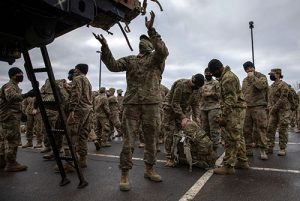As the Americans and NATO vacate Afghanistan a few weeks before the stipulated September 11, 2021 deadline, speculation about the future of the war-torn country is abuzz.
The majority of analysts (and self-proclaimed analysts) are painting a bleak picture of the post-US situation, predicting a dreadful, bloody and long civil war. However, there are few, including me, who can envisage a different picture: a short period of turmoil followed by a grand jirga and peaceful transfer of power. An Afghanistan that will not only attain prosperity in the next decade, but enable the whole region of central Asia, West Asia and South Asia to benefit economically and culturally.
Under normal circumstances, the departure of occupation forces, and that too after 20 years, would have been an occasion of celebration, auguring well for the entire region. But the widespread gloom and apprehensions stem from Afghan history and culture. Also, there is a long list of detractors who don’t want peace. This group is led by Indian RAW, Afghan NDS, gun runners, narcotics barons, Daesh, TTP, contractors, etc. But mercifully there is alongside, a very strong lobby of those who wish, pray and work for peace, spearheaded by Afghans themselves and readily facilitated by China, Pakistan, Iran, Russia and the CARs (Central Asian Republics).
And this time peace is likely to win. Two distinct narratives are doing the rounds. The first: “US forces are leaving in a hurry.” One cannot help but smile if moving out after 20 years can really be termed as a ‘hurry.’ And the second, repeatedly expressed by a section of intellectuals and politicians: “The Americans must first find an amicable political solution between various Afghan factions and only then leave.”
These sentiments are based on the flawed assumption that the Americans and Allies were there to foster peace, democracy and prosperity. To set the record straight, US ambitions in the region should be crystal clear.
- To prevent Chinese influence and its economic hold
- To block any Russian move towards the Indian Ocean
- To keep the CARs landlocked
- To stem the taking-off of the CPEC and thus damage the BRI
- To keep an eye on Iranian nuclear ambitions
- To maintain a surveillance of Pakistan’s nuclear assets, etc.
These American interests are enduring in nature and even after withdrawal from Afghanistan, they are likely to pursue them through India, over-the-horizon operations, Quad Plus (the second line of defence), seeking some base in the region.

And that is where Pakistan is coming under pressure through the FATF, and other sanctions, the IMF, World Bank, etc, the spike of attacks by the TTP, Daesh, BLA etc, the perception management through negative narratives against Pakistan’s Armed Forces and the government, and forecasting doomsday scenarios.
The fact is that the situation today is not that of the one 20 years ago. Hopefully, lessons have been learnt. The Afghan Taliban today are not those of the past in their composition and attitude. They comprise all ethnic groups, have already announced amnesty, and are not looking for a monopoly in governance. Iran and Pakistan are not likely to play proxies. And the economic vacuum in the country is likely to be filled by China, Russia and the CARs.
Pakistan is well prepared to face the fallout of any possible Afghan fratricide, in the shape of a fenced border, the regulation of human traffic, more organised refugee handling, etc.
So all said and done, in our assessment, Afghanistan is moving towards a period of short-term turmoil, followed by a long period of peace and prosperity — contrary to the doomsday scenario being predicted by many (a largely American narrative).
The Afghan situation is fluid, difficult to predict, but in my opinion, likely to unfold as follows:
- The Afghan Taliban will capture most of Afghanistan, except Kabul (which will be besieged) and a few areas under opposing warlords etc.
- There will be a call for a Grand Jirga, assisted by neighbouring countries, Turkey, the UN etc.
- The formation of an all-inclusive government with the Afghan Taliban as major stakeholders.
- Recognition by the world at large
- A flurry of economic activities, north-south and east-west.
And the policy recommendations for Pakistan include:
No favourites, provided others also abide by this (especially, India, US and Iran).
Afghan-led, Afghan-owned solutions for all Afghan issues, facilitated by China, Pakistan, Iran and Russia. India and the US should be kept away. No undue statements, no conditions for recognition. And finally, keeping all options open to pursue our own interests.
These are difficult times for our Afghan brothers and the region, but the first step towards normalisation was the egress of foreign troops, and that has happened. After a shorter historical cycle, this time Afghanistan and the region are moving towards peace, prosperity and harmony.

The writer is a former defence minister and defence secretary. He has held major command positions in the Pakistan Army.



